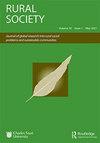Indigenous knowledge indicators in determining climate variability in rural Ghana
IF 1.1
Q3 SOCIOLOGY
引用次数: 9
Abstract
ABSTRACT Climate variability has become a critical issue for rural farmers in Ghana due to its impacts on factors responsible for agricultural food production. The aim of this research was to investigate indigenous knowledge indicators in determining climate variability in rural Ghana.. A descriptive case study using mixed-methods was employed. Questionnaire and interviews were used to gather the data from 211 household heads across six study communities. Quantitative data collected was analysed descriptively while the qualitative information was analysed using a thematic approach. Findings revealed indigenous people used the growth of local plants species, chirping of crickets, wind direction, and millipedes’ movement as indicators to detect an approaching season or sudden variation of climate, while the leaves of the “populs” plant and insect chirping were indicators determining excessive heat. The article recommends the Ghana Ministry of Environment, Science and Technology incorporate indigenous knowledge into climate change adaptation policies and strategies.确定加纳农村气候变化的土著知识指标
由于气候变率对农业粮食生产要素的影响,它已成为加纳农村农民面临的一个关键问题。本研究的目的是调查加纳农村地区确定气候变化的土著知识指标。采用混合方法进行描述性案例研究。通过问卷调查和访谈收集了来自六个研究社区的211名户主的数据。收集的定量数据进行描述性分析,而定性信息使用专题方法进行分析。研究结果表明,土著人利用当地植物的生长、蟋蟀的鸣叫、风向和千足虫的运动作为探测季节临近或气候突然变化的指标,而“大众”植物的叶子和昆虫的鸣叫是确定过热的指标。这篇文章建议加纳环境、科学和技术部将本土知识纳入气候变化适应政策和战略。
本文章由计算机程序翻译,如有差异,请以英文原文为准。
求助全文
约1分钟内获得全文
求助全文

 求助内容:
求助内容: 应助结果提醒方式:
应助结果提醒方式:


